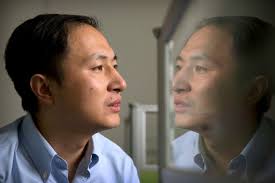For years I have been writing about how our species is at the cusp of a genetic revolution that will transform our healthcare in the short term, how we make babies and the nature of the babies we make in the medium term, and our evolutionary trajectory as a species over the longer term. It’s an argument I make in my forthcoming book, Hacking Darwin: Genetic Engineering and the Future of Humanity.
Today in Hong Kong, a major step was announced moving us toward this genetically enhanced future. A Stanford-educated Chinese scientist reported that female twins under his care were born last month whose pre-implanted embryos had been altered using the gene editing tool CRISPR. It’s hard to overstate what a big deal this first case of gene editing humans is as a harbinger of our genetically modified future — a future arriving far sooner than most of us understand or are prepared for.
Most humans have working copies of the CCR5 gene but the few of us with a mutation disabling the gene become resistant or immune to HIV. By eliminating CCR5 in multiple human embryos, the Chinese scientists were trying to confer immunity to HIV to these potential children. All of the pre-implanted embryos that were altered had been created with the sperm of men with HIV and the eggs of women who did not carry the disease. This is likely why the parents were willing to have the embryos of their potential children gene edited in the hope the disease would not be passed on.
The choice of CCR5 made a lot of sense because a relatively minor single gene alteration had the potential to confer a very significant benefit. But the choice was also controversial because HIV is now a treatable disease and because new gene therapies for HIV look like they will be able to target the same genetic pathway in a manner that does not pass to future children. While polls show that people in many parts of the world are more comfortable with genetic alterations to treat diseases than they are with genetic enhancements, eliminating a future risk of HIV could fall into either category. This will be the case for many other possible genetic changes. One person’s therapy will be another person’s enhancement.
It has been clear for some time now that the moment when we humans could start genetically altering our future children was fast approaching. But given concerns that CRISPR gene edits were not yet sufficiently precise to be used on human embryos taken to term and due to regulatory restrictions in many parts of the world, nobody knew exactly when this line would be crossed.
The aggressive move by the Chinese scientists announced today will cause an international firestorm for some good reasons. Making heritable changes to human babies that will pass to future generations is a very big deal with massive ethical implications that warrants a careful, considered, and inclusive process. This one small change of editing the CCR5 gene may be relatively benign or even potentially beneficial to these particular children, but it could also conceivably cause a harm we do not yet foresee. Nevertheless, it will be hard to argue against making small genetic changes that can potentially ease a great deal of suffering among future generations. Our taboo against “playing god” by making genetic changes to our future children will, over time, be balanced by our need to “play god” to protect our future children from harm once we have the knowledge and tools to do so.
Whatever the case, we urgently need to start developing national and international norms, standards, and regulations that can make sure that that human genetic revolution plays out in ways that optimize benefits and minimize harms.



